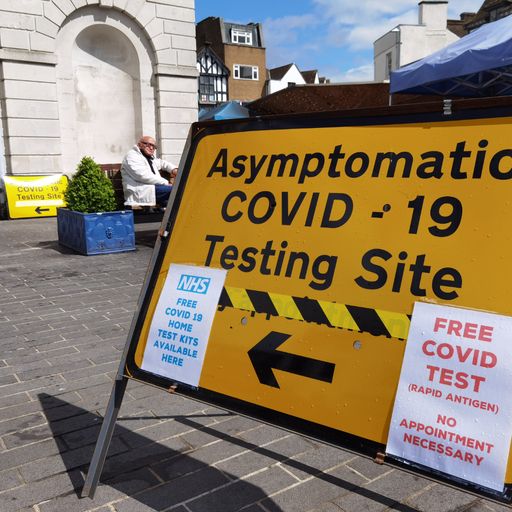COVID-19: Vaccinated people can easily spread Delta variant in households, Imperial College London study suggests
Researchers suggest that to reduce the spread of COVID-19 at home, people should continue to use measures such as regularly washing their hands and throwing tissues away.
Friday 29 October 2021 04:58, UK
Vaccinated people can easily spread the Delta coronavirus variant to people within their household, a study suggests.
The research, undertaken by scientists from Imperial College London, showed how the highly transmissible COVID variant can spread, even among vaccinated people.
However, it did find that people were less likely to be infected if they are double jabbed.
The experts found people who were vaccinated and caught the virus, cleared the infection more quickly, but the peak viral load remained similar to those who are unvaccinated.
This means those who had been vaccinated were as infectious as unvaccinated people, but for less time.
"By carrying out repeated and frequent sampling from contacts of COVID-19 cases, we found that vaccinated people can contract and pass on infection within households, including to vaccinated household members," Dr Anika Singanayagam, co-lead author of the study, said.
"Our findings provide important insights into... why the Delta variant is continuing to cause high COVID-19 case numbers around the world, even in countries with high vaccination rates."
The study, which involved 621 people, found that of 205 household contacts of people with the Delta coronavirus infection, 38% of them who were unvaccinated went on to test positive.
This compared to 25% of contacts who had been vaccinated. This group, on average, had been vaccinated for a longer period than those who tested negative.
The authors of the study said this was evidence of waning immunity, supported the need for booster jabs and demonstrates that unvaccinated people cannot rely on the immunity of those who have been jabbed for protection.
Neil Ferguson, an epidemiologist at Imperial College, said the transmissibility of the Delta variant meant that it was unlikely Britain would reach "herd immunity" permanently.
"That may happen in the next few weeks: if the epidemic's current transmission peaks and then starts declining, we have by definition in some sense reached herd immunity, but it is not going to be a permanent thing," he said.
Follow the Daily podcast on
"Immunity wanes over time, it is imperfect, so you still get transmission happening, and that is why the booster programme is so important."
Researchers suggest that to reduce the risk of transmission at home, people should continue to use measures such as regularly washing their hands and throwing tissues away.
The new study was published in The Lancet Infectious Diseases.






